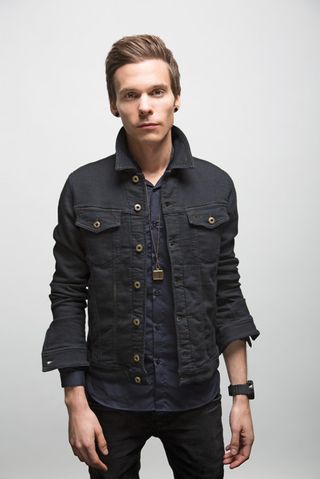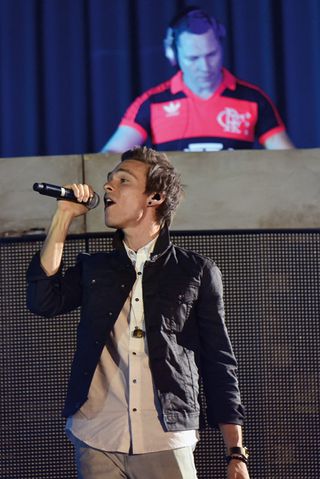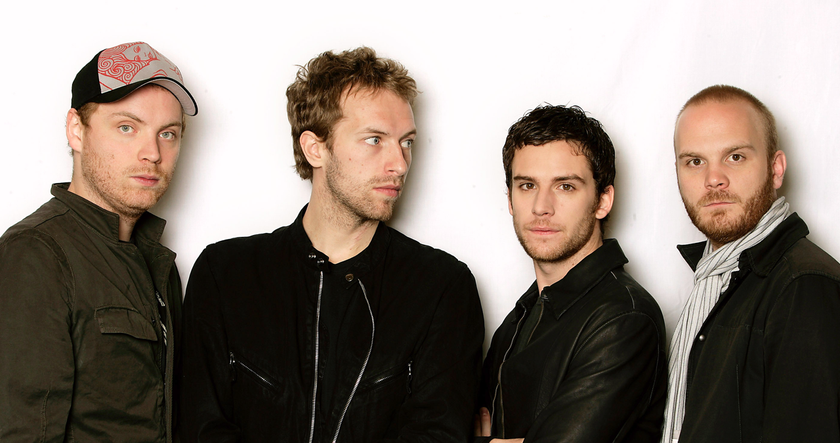Matthew Koma talks EDM, Pro Tools and remixing Springsteen
"When I was growing up, the charts were controlled by rock, R&B and hip-hop, but EDM has encroached into that territory."

In America, Matthew Koma is known as the 'voice of EDM' - and with good reason. This mild-mannered vocalist, producer and songwriter has collaborated with everyone from Afrojack, Hardwell and Showtek to Madeon, Fedde Le Grand and Nicky Romero. He's shared a Billboard dance number one (2012's Spectrum) and co-written a Grammy winner (2012's Clarity) with Zedd, and provided vocals for Tiësto's recent top five UK hit Wasted. Koma even got invited to give Bruce Springsteen a remix makeover for his 2012 single Rocky Ground. Not a name we often mention in the Tech section of MusicRadar.com!
"Yeah, but that's how much things have changed in America over the last few years," says the 27-year-old New Yorker, currently putting the finishing touches to his debut solo album. "When I was growing up, the charts were controlled by rock, R&B and hip-hop, but you've only got to look at mainstream culture in 2014 to see how far EDM has encroached into that territory. It's so embedded in everyday life that I think it's changed how music actually sounds - EDM has shifted music on its axis."
Before we go any further, we have to ask what it's like to remix Bruce Springsteen. How do you add a touch of EDM to The Boss's blue-collar rock?
"I've actually been a huge fan of his music for years, so, above everything else, it was a complete honour. Mind-blowing! To be sitting in the studio, listening to his acappella vocal. But you have to get over that and ask yourself, 'What does this song need?' The only way you can do a job like that is to treat it just the same as you would treat any other song.
"Musically, I tried to take it somewhere different, and when I didn't hear back for a couple of weeks, I figured I'd messed up. I just kept thinking, 'You should have played it safe'; I was worried that I'd offended The Boss. Then, word came back that everybody liked it, and they even shot a video for it. Hearing it on the radio was probably the biggest moment of my life - he's been a complete hero of mine since I was a little kid."

So you didn't grow up with dance music?
"Not at all. Our house was very, very musical; my dad [Gerald Bair] is a singer-songwriter, my brother was in a band, my mom sang a bit. I suppose you could say that the stuff I was listening to was traditional, band-based stuff like Bruce and Soul Asylum. Classic songwriting with guitars and tape machines. The thing is, when you're just a kid, you're not interested in labels. To me, it was just music."
Get the MusicRadar Newsletter
Want all the hottest music and gear news, reviews, deals, features and more, direct to your inbox? Sign up here.
When and how did you drift over to computers and beats?
"You've got to remember that I grew up in New York. I was surrounded by every sound and musical style you could think of. Beats were always part of my life, but they existed as a very separate entity to the music I listened to at home. In fact, back then, electronic music in America sort of existed separate to almost everything else that was out there. It was on its own… underground. If you were into dance music, you were just into 'dance music' and nothing else. You went to particular clubs and lived a very specific lifestyle.
"Over time, I got to know people from that genre and, eventually, there was talk of working together. Initially, I felt that the electronic environment was just too far away from what I knew - it wasn't really about songwriting; it was about a groove, or a killer loop, or a particular hook. But I soon began to see those differences as exciting and inspiring. You shouldn't ignore a type of music just because it doesn't sit in your natural context. For me, it was a new way of thinking… How could I bring traditional songwriting into this new area? How could we bring the two together?
"Some kids spend 20 hours a day on video games, but I spent 20 hours a day learning recording and mixing"
"I'm not saying I was the first person to do that, but back then, the idea was kinda different - certainly in the States. For most artists, if you were punk, you were punk; if you were garage, you were garage. If you tried to do something a little different, you could easily get criticised. These days, it's all changed. It's all coming together and you've got blurred lines all over the place; different artists working together with wildly varying pallets of sound. That's pretty cool!"
When did you start making music on a computer? Were your early years dominated by guitars and four-tracks?
"I did have a little Yamaha four-track, but I started screwing around with Acid when I was about 11. To me, it seemed more like a videogame than a music program. By that, I mean I approached it as I would a videogame. Here is this fun thing, let's master it. Wow, I can make a loop and some weird sounds. It wasn't like having to learn the violin.
"Then, I remember going into a professional studio with my dad and seeing something called Pro Tools. That's been my language since I was 13."
You started using Pro Tools at 13?
"[Laughs] Like I said, I was lucky to grow up in a musical family. My parents could see I was interested in this stuff, so they bought me a Pro Tools rig. Again, I approached it with the naïve enthusiasm that controls every aspect of your life at that age. Some kids spend 20 hours a day on video games, but I spent 20 hours a day learning the ins and outs of recording and mixing. I wanted my music to sound like it was more than just a bedroom demo.
"Of course, there were some musicians who were very suspicious of computer-based music. Y'know: 'Hey, the drums will sound much better if we record them straight to tape through this 1960s valve preamp'. People still argue about this today, and they'll argue about it for the next hundred years. For me, it was simply about convenience and what Pro Tools allowed me to achieve. Did I really want to spend my life bouncing down four tracks of drums to quarter-inch and working out if I've got enough room for backing vocals? I think we all know the answer to that one."
Have you ever investigated the likes of Ableton, Cubase, Reason, Logic, etc?
"Investigated, yes, but Pro Tools just seems so natural to me. Right from day one, it made sense; I could look at a screen and know what everything represented. Sure, I know that Pro Tools is not everyone's first choice, and a lot of people I work with think I'm crazy for not switching over to Logic, but I still love making music on it! It really is like a native language… it's what I feel comfortable with.
"Even though I make 'EDM music', I still place a lot of emphasis on audio, live instruments and vocals. Especially vocals. Pro Tools is the best place for me to do what I need to do. OK, the MIDI might not be as all-encompassing as other platforms, but it works just fine and does everything I need it to do. When it comes to vocals and getting the best sound you can possibly get, there's nothing out there that's better at recording or editing. I can't see me making the change any time soon."

What's the 2014 setup?
"A very simple Mac-based mobile studio with an Apogee soundcard. The only other things I need are my little Radial lunchbox with a hardware API preamp and this amazing compressor from Inward Connections called The Brute; then there's my U87 and a carry case - and that's my studio. It can go on a plane; it can travel with me to other studios; it can live at home; it can be set up in a hotel room at 5am. I am a happy camper!"
There are plenty of great, classic software compressors out there. You could ditch the lunchbox, too…
"Yes, there are! I've got the CLA Blue Stripe, and it's awesome on bass, vocals and synths. Some of the EQs are just out of this world, too - the SSL EQs are great for live stuff, and the FabFilter Pro-Q can bring a synth to life. The Brute just happens to be my current favourite. Man, I'm obsessed with that thing. It's a total badass!"
Pro Tools uses RTAS plugins rather than VST. Does that makes things harder? Do you feel you're losing out?
"A plugin is a plugin. And if something is only available as a VST, you can usually find a wrapper that will solve all your problems. Pro Tools is no different to working in Ableton or Logic, except that with Pro Tools, you've got the best audio platform out there."
All mixing done in the box?
"If I record some drums in a studio, I might find myself in front of a Neve desk, but 99% of the work is done inside the computer. And it's at that mixing/production stage that the plugins really start to take effect.
"Number one for me has to be Melodyne - easily the greatest weapon you can have in your arsenal. Not just for vocals, but also for the way it can manipulate audio to create some truly original sounds. I love to blend voices with synths and guitars - track the two together and you will always end up with something interesting. For guitars, it has to be AmpliTube; their Fender collection is incredibly accurate. Absolutely anything by iZotope. God, the list could go on and on.
"Even though I make 'EDM music', I still place a lot of emphasis on audio, live instruments and vocals"
"It's the same with synths… there are just so many good ones out there; so many go-to plugins. The FabFilter Twin gives you some wonderfully quirky and weird sounds. Omnisphere is a must for EDM. One thing you need to bear in mind when you're looking for a new synth is that any plugin is just a musical tool, like a guitar or a set of drums. Loads of people own Fender Stratocasters and loads of people own Omnisphere, but it's what you do with it that gets you noticed.
"The strange thing about this current climate is that the availability and quality of the technology out there has made the music business a fairly even playing field. Any 18-year-old can buy a laptop that comes pre-loaded with GarageBand, and they can put a track together in days. Get yourself on SoundCloud and the world is there for you. That journey from idea to actually creating something people can listen to is a lot shorter and a lot more direct than it used to be.
"But - and this is a big but - the fact that everybody has access to the same tools as you means that it's more important than ever to find a sound that's unique. It's the same old story: follow the crowd and you'll get lost in the crowd."

Vocally, you've worked with a lot of different people. Do you tend to work on the vocals alone, or is it a collaborative process in the studio?
"I don't really like working on vocals 'in the studio'. It can feel a bit too… formal. I like to take a song away and listen to it on a plane or while I'm at home. That's when the best ideas come. Obviously, the production side of things is a lot more collaborative. I always like to produce my own vocals, but if the person I'm working with - like, say, Tiësto - feels I've got something to offer in the studio, I like to dive in there."
You've announced that your forthcoming debut album will be 'beats-driven', but there's quite a lot of footage out there of you sitting on a stool playing an acoustic guitar. Presumably, if a hardcore EDM fan turns up to a coffee bar and sees you strumming, they might be a bit… surprised?
"If I do a solo acoustic show, it's different to a DJ set, which is different to a full live band set at an outdoor festival, but they all overlap at some point. Artists no longer have to be 'just EDM' or 'just folk' or 'just rock'. This generation accepts that kind of cross-pollination. You can have Coldplay and Avicii on the same stage, but that's how music should be. Let's keep blurring those lines."
RAC's Cheap Sunglasses, featuring Matthew Koma is available now. Matthew's debut album is currently in the final stages of production for an early 2015 release.


Computer Music magazine is the world’s best selling publication dedicated solely to making great music with your Mac or PC computer. Each issue it brings its lucky readers the best in cutting-edge tutorials, need-to-know, expert software reviews and even all the tools you actually need to make great music today, courtesy of our legendary CM Plugin Suite.











